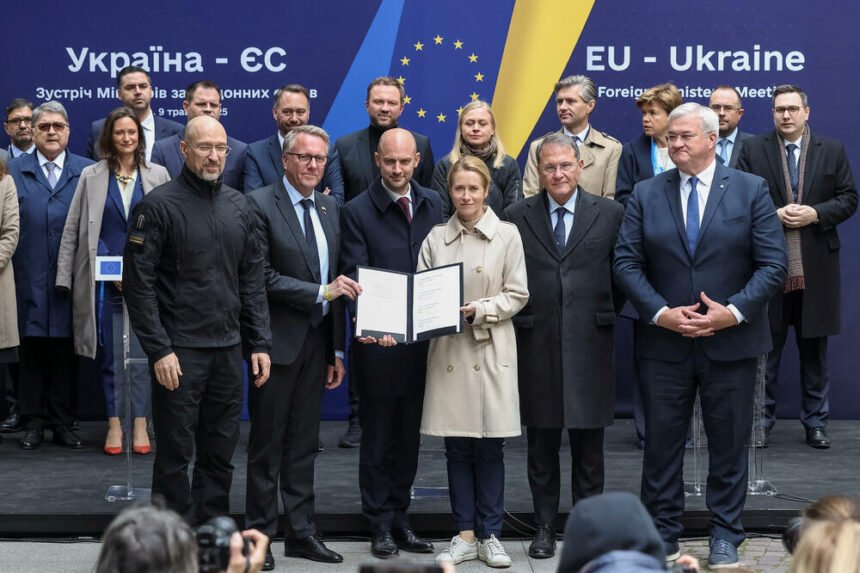A group of EU foreign ministers has paved the way for the establishment of a special international tribunal that will address Russia’s aggression against Ukraine. The planned tribunal will focus on holding accountable the state officials responsible for the war.
The decision was made during a meeting in the western Ukrainian city of Lviv, where Ukraine and its allies gave the green light for the creation of the tribunal. The preparations for the tribunal have already been carried out by the Council of Europe, according to a joint statement issued by the Ukrainian Ministry of Foreign Affairs.
On Friday, 30 foreign ministers, including Germany’s new foreign minister, Johan Vadeful, visited Ukraine to sign the statement.
This decision can be interpreted as a message to Russian President Vladimir Putin, who was simultaneously in Moscow marking the anniversary of the Soviet Union’s victory over Nazi Germany in World War II with a military parade and justifying the invasion of Ukraine once again.
The Tribunal Will Address the ‘Crime of Aggression’
The tribunal will “ensure that the main perpetrators of the aggression against Ukraine are held accountable,” said EU foreign policy chief, Josep Borrell. She added that Russia’s war in the age of information is well documented and “there is no room for impunity.”
Ukrainian President Volodymyr Zelensky also joined via video, stating that it is Europe’s moral duty to hold Russia accountable for the war.
The tribunal is set to operate under the Council of Europe, which was established after World War II primarily for the protection of human rights. Its headquarters will be located in The Hague, Netherlands, where several international legal organizations are already based. Verdicts will be pronounced in absentia for the accused. The tribunal will consist of 15 judges, each serving a nine-year term. The EU estimates the costs at around one billion euros.
While the International Criminal Court (ICC) holds jurisdiction over war crimes worldwide, it cannot act in the case of Ukraine, as both parties involved in the conflict must be signatories of the Rome Statute and the additional protocol.
The US Withdraws Support
Countries supporting the establishment of the tribunal include Australia, Norway, Liechtenstein, the UK, Costa Rica, and Guatemala. However, following the return of Donald Trump to the White House, the United States withdrew its support.
Polish Foreign Minister Radosław Sikorski told DW that the “US withdrawal from supporting the tribunal is one of the many concessions the new US administration has made to Vladimir Putin.” He added that no concessions from Putin can yet be discerned and expressed hope that Trump would now “draw the right conclusions.”
German Foreign Minister Vadeful stated in his first conversation with US colleague Mark Rubio that he would advocate for Washington’s return to the group supporting the tribunal. He emphasized that “it is a positive sign that a large part of the free world and countries supporting the rules-based order has now moved forward to create this institution.”
What Do Experts Say?
Even before this political decision, experts debated the possible scope and limitations of such a tribunal. “The special tribunal will not try Vladimir Putin in absentia as long as he remains president of Russia,” confirmed an EU representative at a briefing in Brussels on April 10.
Gleb Bogush from the Institute for German and International Criminal Law at the University of Cologne criticized this stance, which effectively grants immunity to the Russian political elite as long as they remain in office. According to Bogush, the decision to grant Putin immunity sends a dangerous message that could be interpreted as a call to ignore the arrest warrant issued by the International Criminal Court (ICC).
Under the tribunal’s plan, investigations against Putin, Lavrov, and Mishustin may lead to charges. However, unless immunity is lifted, no indictment can be filed, nor can an arrest warrant be issued.
Institutional Framework in Place
The Council of Europe believes that “the formula found for the special prosecutor will be sufficient to ensure accountability and combat impunity.” Its representatives stress that international law continues to develop despite obstacles and that “personal immunity is not a blank check for impunity.”
The plan for the tribunal was drafted by a group of leading legal experts starting in 2023 and was presented in March 2025. It includes an agreement between Ukraine and the Council of Europe, a statute, and an agreement on tribunal management.
Kyiv will present the results of its investigations to the tribunal, and evidence collected by the International Center for the Investigation of the Russian Invasion of Ukraine (ICPA) in The Hague will also be considered. The ICPA was established with the support of the European Commission and consists of selected national prosecutors.
The Council of Europe has been selected as the institution under which the tribunal will operate. The United Nations was not considered, as Russia holds veto power in the Security Council and would block such a project there.
If a two-thirds majority in the Council of Europe supports the tribunal, it will be followed by ratification in many member state parliaments, which could take months. “In wartime, swift action cannot be expected,” says Gleb Bogush. According to him, certain political currents in different countries may view the tribunal as an escalation of the conflict or as a step that hinders negotiations. “This could significantly slow down the process or even stop it entirely,” he concludes.







